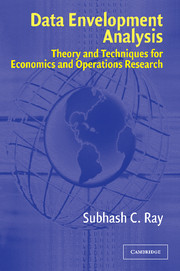Book contents
- Frontmatter
- Contents
- Preface
- 1 Introduction and Overview
- 2 Productivity Efficiency, and Data Envelopment Analysis
- 3 Variable Returns to Scale: Separating Technical and Scale Efficiencies
- 4 Extensions to the Basic DEA Models
- 5 Nonradial Models and Pareto–Koopmans Measures of Technical Efficiency
- 6 Efficiency Measurement without Convexity Assumption: Free Disposal Hull Analysis
- 7 Dealing with Slacks: Assurance Region/Cone Ratio Analysis, Weak Disposability, and Congestion
- 8 Efficiency of Merger and Breakup of Firms
- 9 Efficiency Analysis with Market Prices
- 10 Nonparametric Approaches in Production Economics
- 11 Measuring Total Productivity Change over Time
- 12 Stochastic Approaches to Data Envelopment Analysis
- 13 Looking Ahead
- References
- Index
Preface
Published online by Cambridge University Press: 24 November 2009
- Frontmatter
- Contents
- Preface
- 1 Introduction and Overview
- 2 Productivity Efficiency, and Data Envelopment Analysis
- 3 Variable Returns to Scale: Separating Technical and Scale Efficiencies
- 4 Extensions to the Basic DEA Models
- 5 Nonradial Models and Pareto–Koopmans Measures of Technical Efficiency
- 6 Efficiency Measurement without Convexity Assumption: Free Disposal Hull Analysis
- 7 Dealing with Slacks: Assurance Region/Cone Ratio Analysis, Weak Disposability, and Congestion
- 8 Efficiency of Merger and Breakup of Firms
- 9 Efficiency Analysis with Market Prices
- 10 Nonparametric Approaches in Production Economics
- 11 Measuring Total Productivity Change over Time
- 12 Stochastic Approaches to Data Envelopment Analysis
- 13 Looking Ahead
- References
- Index
Summary
Researchers from diverse fields ranging from economics to accounting, information management, and operational research use Data Envelopment Analysis (DEA) to measure technical efficiency of firms (often called Decision-Making Units [DMUs]). Scholars from the different disciplines, in general, approach the question of measuring efficiency from different perspectives. Often, an operations research analyst is primarily interested in the solution algorithm of an inequality-constrained optimization problem but is less careful in defining the inputs and outputs. At times, the input variables may include both the number of workers and wage expenses even though, under the implicit assumption of competitive wages, they are broadly proportional to one another. Similarly, sometimes both sales revenue and profits earned are defined as outputs, even though profit maximization is the implicit objective of the firm. Clearly, the efficiency measure derived from an optimization model becomes more meaningful when the choice variables and the constraints correspond to an explicitly conceptualized theory of firm behavior. At the other end of the spectrum, there are numerous empirical applications in economics where some DEA model is employed to evaluate efficiency without careful attention to the appropriateness of the specific version of DEA for the production technology and the implicit objective of the firm. For the applied researcher, a clear understanding of the differences between the various DEA models is absolutely necessary for a proper interpretation of the results.
Information
- Type
- Chapter
- Information
- Data Envelopment AnalysisTheory and Techniques for Economics and Operations Research, pp. ix - xiiPublisher: Cambridge University PressPrint publication year: 2004
